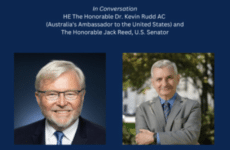By: Iain Wilson
Posted In: News

Photo credit: mtv.com
Presidential candidates Obama and McCain. Photo courtesy of mtv.com
Never before has the country seen anything like the relentless media coverage of the 2008 Presidential Election. For almost two years, nightly newscasts have tirelessly covered every move the government has made, drilling home the idea that our nation is in serious trouble. We have troops in Iraq, an economy struggling to stay afloat and three hundred million people asking the same question: Where do we go from here? This election may go down as one of the most important in history, as our nation stands at a crossroads, teetering dangerously close to the edge of a national crisis.
The race to replace George W. Bush has also been a race of firsts. Coverage of the election exploded after Senator Hillary Clinton announced her intentions to run for office. Add to this the first nomination of an African-American for president and the potential for a woman to serve as vice president, and you have the perfect storm of political scenarios descending upon Washington. Another first throughout the coverage of this presidential race has been the active role of young Americans in supporting their candidate. Whether liberal or conservative matters less compared to the fact that college students across the country believe their vote counts. It could be the issues at hand or the media force-feeding the public information about candidates. It could even be Tina Fey as Sarah Palin on Saturday Night Live, turning a landmark election for our country into Fey’s most successful attempt to revive her career. Hopefully not, though. It could be the presence of Barack Obama, the man who is riding the magic carpet of change to one of the most successful young careers in political history. Four thousand, one hundred and eighty-eight American troops have died in the Middle East, many of them young men, resulting in a sparked interest in young people to remove soldiers from the area and back stateside. Forget about issues, and you are left with the possibility that this constant flow of information from internet, print and broadcast media outlets has finally saturated the minds of today’s youth. Students and faculty around Salve Regina have varied opinions on the upcoming election, but the one strand that threads through campus is the recognition of the importance and implications this election will have on our country’s future. Dr. Donna Tocco-Greenaway, professor of politics at Salve and advisor for the university’s College Republicans branch, recognizes the political awareness amongst her students. “I think the explosion of Internet applications has brought students into direct contact with the candidates,” Tocco-Greenaway said. She mentions YouTube and Facebook as greatly increasing the ease and consistency with which students can access clips from interviews and debates. Typing in “Sarah Palin” on YouTube will leave you with about 94,500 videos. Hell, you could become an expert on Sarah Palin without ever having to read single word about her. Zac Giorgis, a senior and Vice President of Salve’s Student Government Association, puts less emphasis on the role of increased media in attracting interest. He states that issues are the driving force behind interest, emphasizing the war in Iraq and the flailing economy as major factors in igniting public opinion. Giorgis also mentions what many people will use as ammunition when they head to the polls, the idea that, “No one likes George Bush.” His success in office is debatable, but his role as one of the most loathed men in America will inspire many of the least politically aware individuals to vote against him. Gracie Mullen-Thompson, a Massachusetts native and sophomore at Salve, says, “This change from apathy to sympathy stems from a firm belief that a vote can change our country.” She goes on to add that even the least informed of her friends will head to the polls on Tuesday. The passion that fuels this youth movement in politics may constitute its downfall as well. We, as young people, are under the impression that this vote can and will change the course of our country, that if we vote Barack Obama into the White House our nation’s problems will disappear. Symeon Giannakos, professor of politics at Salve Regina echoes this point, saying, “Where older voters tend to be more patient with concerns, younger voters tend to be impatient and want speedy resolution on things.” This is the generation of instant gratification. When you apply this ideal to the presidential election, false assumptions about speed with which our country can heal are made. Regardless of the results of Tuesday’s election, our country faces a long walk down the road to stability. The candidates have frequently made appeals to the young voters in this country, emphasizing the importance their vote will have on this election, and for the first time in a long time, we’re actually listening.













